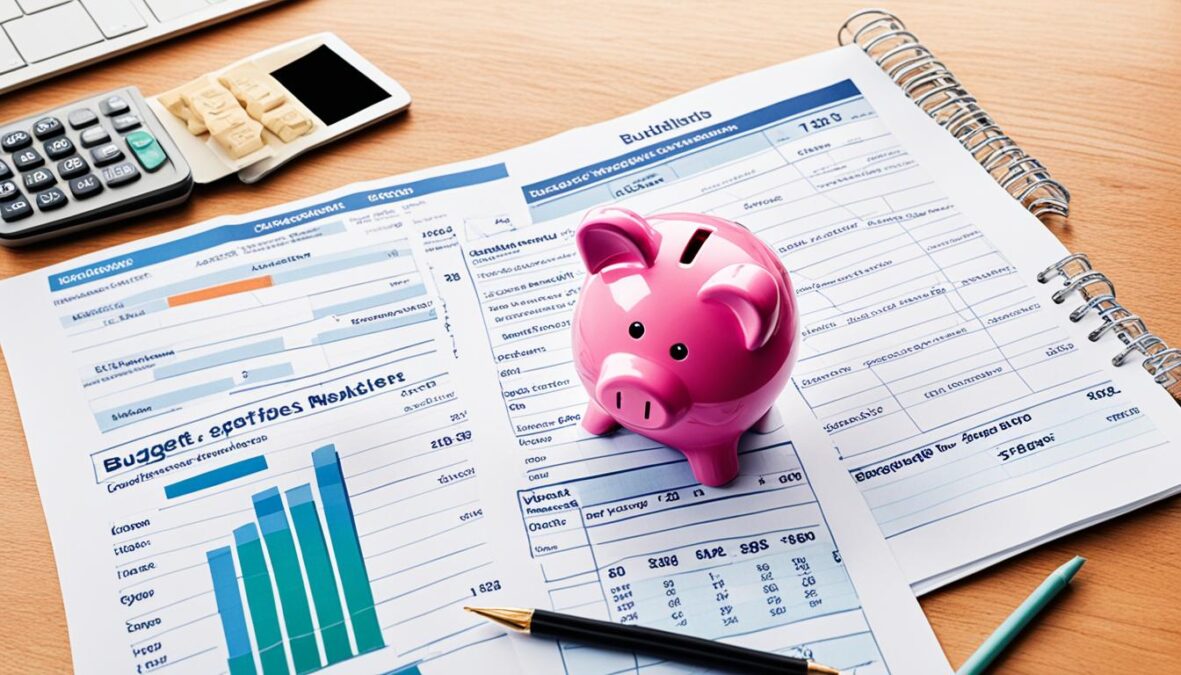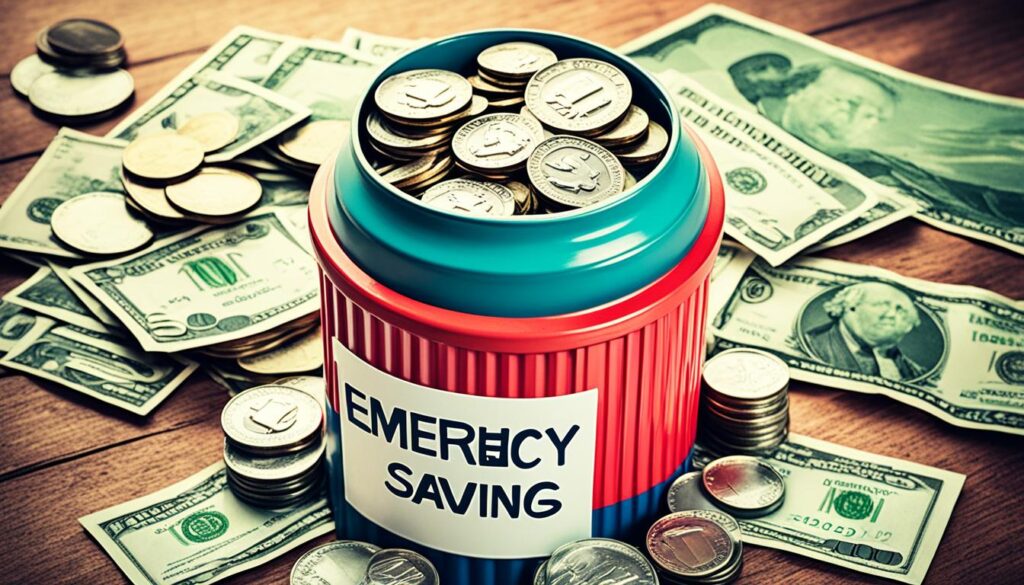Have you ever felt like you’re always stressed about money? Do you worry you can’t pay your bills or save for your dreams? If you said yes, it’s time to start budgeting. Budgeting is key to managing your personal finances well. It can help you be more stable financially, lower your stress, and meet your money goals.
- This guide is here to offer practical advice on how to budget.1 By budgeting and sticking to it, you enhance your financial health. You also wisely use your money for expenses, savings, and paying off any debt. This leads to a better chance of having a stable and brighter financial future.
Key Takeaways
- Budgeting is a crucial tool for taking control of your finances and achieving your financial goals.
- The 50/30/20 budgeting rule can provide a simple and effective framework for managing your money.
- Utilizing budgeting tools and apps can simplify the process and provide valuable insights into your spending habits.
- Prioritizing debt repayment and building an emergency fund are essential components of a successful budgeting strategy.
- Regularly reviewing and adjusting your budget is key to maintaining financial stability and progress.
What is a Budget and Why is it Important?
A budget is a plan for your money, showing what comes in and goes out. It helps you spend your money wisely.2 You figure out how much you make each month. Then, you decide what you must spend on, and what you’d like to. Finally, you split your money based on these needs.2 Making a budget shows where you stand financially and how you can do better. It means you’re in control of your cash and can reach money goals sooner.2
By budgeting, you get more freedom with your money, less worry, and quicker success in reaching your financial dreams.2
Understanding the Budgeting Process
Building a budget helps you stay in charge of your finances. It requires knowing what bills you have and guessing what those less fixed costs might be. This way, you make sure you earn more than you spend.2 You need to watch your spending every month. This way, you can spot how to save and change your spending to need less.2 Figuring out your incoming money minus what goes out keeps you on top of your cash.2
Benefits of Budgeting
Creating a budget has many advantages for your money’s health.2 You’ll learn a lot about how you spend. This knowledge helps you cut out what you don’t need.2 By dedicating some of what you make to the must-haves, paying off debts, and saving, your money situation gets better. You can even start a fund for the unexpected or retirement.2 Also, a budget helps you handle what you owe better, avoiding extra fees and getting more stable financially.2
Without a budget, you might spend all your money before you get your next check.2 It’s smart to keep money for later separate and open a special savings account. This makes sure you don’t pay more than necessary on credit cards and have money for sudden big needs.2 Reviewing your budget every month is key for good money management.2
If you save, you can deal with big buys or surprises, like fixing your car.2 Adding saving as part of your spending plan helps you think ahead.2 Watching what you spend daily can show you where to be careful.2
Since late 2023, the average credit card debt for one person has been over $6,000. That’s a big reason to keep to your budget, saving a little of your money each week for a safety net.3 Apps like Mint or YNAB can guide you in this, based on what works best for you.3
A budget shines a light on how you spend, helping you make smart choices in your fun spending to meet your money goals, like saving for a big trip.3 It’s wise to have enough money set aside to live for a few months without a job. That way, you won’t have to mess with your long-term savings.3
Working on your budget means you’re putting money away each month for your future, like in retirement accounts.3 And having an emergency fund in your budget protects you from financial blows, like losing your job or dealing with a big expense.3
By budgeting, you make sure you don’t overspend, keep an eye on your money coming in and going out. This approach helps you hit your saving goals.3
The 50/30/20 Budgeting Rule
The 50/30/20 rule offers a clear way to handle your money. It advises using 50% of your income on needs, 30% on wants, and 20% on savings and debts.4
Allocating 50% for Needs
Half of your income should go to your needs. This covers things like your home, food, and bills. It also includes any essential debt payments.45
Allocating 30% for Wants
You can spend 30% of your money on wants. This is for things like eating out, traveling, and your hobbies. It’s important to enjoy life, but keep it balanced with your needs.45
Allocating 20% for Savings and Debt Repayment
The last 20% is for savings and paying off debts. Save this for your future, reduce your debts today. This way, you become more financially secure over time.465
Creating and Tracking Your Budget
The first step to budgeting is figuring out your net income. This is what you have left after paying taxes and other deductions.7 Start by totaling your pay from your main job and any extra money you make, like from a side job.7 Then, take away the money you must pay out to find your net monthly income. This amount will be the base for your budget.
Choosing a Budgeting Method
There are many ways to budget, like the envelope system. With this, you put cash into envelopes marked for different expenses.8 The zero-based budget makes sure you spend every dollar wisely, with no money left over.8 You can also use apps or spreadsheets to keep track of spending, showing you where your money goes.
Utilizing Budgeting Tools and Apps
Many tools and apps can make budgeting easy. They offer things like sorting expenses for you, tracking spending in real time, and connecting with your bank accounts.8 Apps such as Mint, YNAB, and Personal Capital are great for managing your money better.
Categorizing Expenses: Needs vs. Wants
When you make a budget, it’s key to know what you need versus what you want. Needs are what you must have for your health and to stay financially strong. This means things like where you live (paying rent or a mortgage), bills like water and electricity, food, how you move around (like cars and buses), and the smallest amount of money you have to pay back.9 You can’t skip these costs, and they should come first in your budget.
Examples of Needs
Needs are usually food, a place to live, bills for your home, how you get around, keeping safe with insurance, and stuff you need for work.9 Things like saving for unexpected problems, paying off what you owe, or planning for the time when you stop working are also needs in your budget.9 It’s key to look at how important and long-lasting these items are. This helps as you adjust your budget with time.9 Tools that help you budget, like Goals and Budgets, can make handling money easier by offering tips and setting budgets for you.9 It’s good to regularly think about what you really need versus what you just want to make sure your spending matches what truly matters to you.9 Making it a habit to check if something is a need or a want before you buy it can help you spend your money more wisely.9
Examples of Wants
Wants make life more fun and enjoyable but are not necessary for staying alive. This grouping covers eating out, fun activities, seeing shows, TV or music subscriptions, going places, doing hobbies, and other fun buys.9 While wants are good for your happiness, they shouldn’t take up as much of your budget as your needs should. This follows the 50/30/20 rule.10 Everyone sees needs and wants differently, depending on their life stage and what’s going on for them.9
| Needs | Wants |
|---|---|
|
|
Prioritizing Debt Repayment
Managing debt well is key to a good budget. First, focus on high-interest debts like credit cards and personal loans. These grow fast, hurting your finances.12 Credit cards, for example, can hit you with rates as high as 30%, making them urgent to pay off.12 You should consider strong pay-off strategies like the debt snowball or debt avalanche methods. These can cut your interest costs and boost your credit.
13 With the debt avalanche method, you start by tackling the highest-interest debt first. This strategy can save you about $6,000 in interest and help clear debt four years earlier than if you only paid the minimum. On the other hand,13 the snowball method starts with the debt that has the smallest balance. It can save you $4,600 in interest and get you debt-free around four years faster.
13 The avalanche method is all about hitting that high-interest debt first. You just pay the minimum on others.13 On the flip side, the snowball method rolls through smaller debts first. This approach gives you quick wins that keep you motivated.12 Consolidating your debt can help you spend less and save time in the long run. But12 watch out for those balance transfer credit cards. Their low starting rates can jump up later.12 Again, the avalanche and snowball differ in how they order debts.
13 Use budget tools and the 50/30/20 rule to keep your money in check. This rule says put 50% on needs, 30% on wants, and 20% towards saving and debts.13 For debt, always pay the highest-interest one down first. And don’t forget those minimum payments on all your debts.13 Strategies like debt snowball or avalanche can really speed up paying off debts. Plus, putting extra cash onto high-interest debts cuts down your cost and time spent in debt.
14 Take 5-10 percent of what’s left in your budget for more debt payments.14 Cut costs in your daily spending to squeeze more for debt payback.14 Refinancing a loan or mortgage can reduce your interest bill. And14 online banking makes managing all this a lot easier.14 Also, with One Deposit Checking from Citizens, you could avoid monthly fees. This can free up some cash for paying off debts faster.
12 Make a budget that separates bills you must pay from the ones you choose to.12 Look closely at those optional costs. This is key to find more money for debt payback.12 After the must-pay stuff, throw the rest at your debts based on your plan.12 Being adaptable is crucial as you pay off debts. It lets you tweak your approach without losing sight of your main goal.
Building an Emergency Fund
Creating an emergency savings fund is key to being financially stable. It acts as a safety net, providing money for sudden needs like fixing your car or losing a job. To be prepared, financial experts advise saving enough to cover three to six months’ expenses. This will keep you from turning to loans when times get tough.15 Regular saving makes you feel more secure, offering peace of mind for the future.15
When starting, aim for small savings targets at first, not the full amount. This makes the process easier.16 Use automatic payments to steadily grow your fund. This can be done through work with direct deposit.16 Avoid spending more when you see your savings growing automatically. Make a plan to save a set amount at specific times, whether it’s every month or per paycheck.16
Pick a safe place to keep your emergency savings, like a bank, credit union, or a prepaid card. Keeping cash should be your last choice. Define what counts as an emergency expense to keep your savings safe.15 Check your savings often to see how they’re growing. This will motivate you.15
Remember, having an emergency fund is vital for being ready for life’s surprises. By making this a priority, you’re taking a big step toward financial security. This helps you face challenges with confidence, knowing you have a safety net.1516
Budgeting for Retirement Savings
Budgeting for retirement savings is a key long-term financial goal. It should be part of your overall budgeting strategy.17 You should try to at least match your employer’s contributions in a 401(k) if it’s available. This adds to your savings in a big way.17 Make sure to check the different investments in your plan. They should fit your comfort with risk and your retirement dreams.
Employer-Sponsored Retirement Plans
If your job has a 401(k), put in enough to get what your employer offers.17 This includes money that you didn’t have to put in yourself, which really helps your retirement funds. Also, look at what your plan offers to pick investments that suit your needs and goals.
Individual Retirement Accounts
You can also save for retirement with IRAs, like Roth IRAs or traditional IRAs. These accounts give you tax benefits. Your money can grow with fewer tax cuts or none at all, depending on the type.18 When planning how to use your money, set aside a share of it for IRAs. This way, you steadily work towards your future financial security.
Adjusting and Reviewing Your Budget
Your budget is like a living thing, always changing. You should check and tweak it as needed.1 When your money situation changes – maybe you get a better job or your family grows – your budget needs an update. You might need to move money from one spending area to another, or change how much you save or pay off debts. Being able to change your budget keeps your money plans in step with your life.
Evaluating Progress and Setting New Goals
It’s key to check how you’re doing against your budget and set new goals. Look at your budget every month or every three months to see how you’re doing.1 This helps you find what’s working well and what you need to fix. It’s also a chance to set new, bigger financial goals. By always looking at and adjusting your budget, you can better manage your money. This is how you move closer to your big financial dreams.
Money-Saving Tips and Strategies
To improve your financial health, start by making a detailed budget. Then, look for ways to cut costs. This could mean canceling unused subscriptions or eating out less. By doing this, you can save more money to pay off debt or reach other goals.19
Reducing Unnecessary Expenses
First, try saving a small amount regularly. Aim to save 15 to 20 percent of your income over time.19 You can save money by enjoying free or low-cost activities and by dropping subscriptions you don’t need.19
Think about what you’re saving for. You might want to save for a short-term goal, like a vacation. Or, you might aim for a long-term goal, such as retirement. It’s important to save for both.19
Negotiating Bills and Subscriptions
It’s also smart to talk to your service providers about better deals. This includes your cable, internet, or phone companies. By asking, you might find ways to lower your bills.20 You can change your service plans to save even more.20
Don’t forget to check your memberships and subscriptions. If you’re not using them, cancel them. This can help you stick to your budget.20
For your savings, you have many options: from basic savings accounts to investing in stocks.19 Also, setting up automatic transfers helps you save without thinking about it. Make sure to review your budget and savings regularly to stay on track.19
On average, families spend a lot on food away from home. Watch your spending in this area.20Keep an eye on student loans and credit card debts. Also, look for simple ways to cut costs in daily life.20
Now might be a good time to open a savings account. Interest rates are going up.21So are the rewards on some credit cards. These can save you money on groceries and dining out.21
Use apps and tools to keep track of prices and find deals. For instance, the Camelizer can help you save on Amazon. And the ShopSavvy app makes finding in-store deals easy.21
Automate your savings with bank transfers. Apps like Digit can also help you save without much effort.21Look into refinancing loans and getting energy-efficient home upgrades to save even more.21
Conclusion
Learning to budget well is key for financial stability and long-term success. Use the tips from this guide to craft a personalized budgeting plan. This plan should meet your own financial needs and goals.22
Budgets aren’t the same for everyone. You might need to try different ways to see what fits you best. Keep at it, stay flexible, and keep getting better at budgeting. This will help you stay on track to meet your big financial dreams.22
Once you’ve got your budgeting skills down, you’re on track to reach financial stability and the long-term success you’re after. Keep going, and let this guide support you as you get better at budgeting.
FAQ
What is a budget and why is it important?
A budget is a plan that shows how much you earn and spend. It’s key to managing your money well. Budgeting lets you see your financial health, find ways to do better, and meet your money goals.
What are the benefits of budgeting?
Budgeting brings better financial safety, less worry, and easier goal achievement. It lets you understand your spending, cutting down on what you don’t need. This means you can use your money better for what matters.
What is the 50/30/20 budgeting rule?
The 50/30/20 rule says to use half of your money on needs, 30% on wants, and 20% on savings or paying off debts. This plan is simple and helps keep your finances in check.
How do I determine my net income for budgeting?
To find your net income, add your job’s take-home pay to anything extra you make, like from side jobs. Then, minus what you have to pay from taxes or other fees. This is your net monthly income for planning your budget.
What are the different budgeting methods I can use?
Choices for budgeting methods include envelopes, zero-based, or using apps and spreadsheets. They help you keep track of expenses and sort out where your money goes. This gives you a clear view of your financial health.
How do I distinguish between needs and wants in my budget?
Needs are must-haves like your home, food, and getting around. Wants are things that make life fun but aren’t musts. This includes eating out and entertainment.
How can I effectively manage and repay my debt?
First, focus on paying off high-interest debts fast, like credit cards. Use methods like the debt snowball or avalanche to get rid of them. This saves money and boosts your credit score.
Why is it important to have an emergency fund?
Having money saved for emergencies means you don’t need to use credit for sudden costs. It’s suggested to have enough in savings to cover 3-6 months of living expenses. This can prevent financial problems in hard times.
How do I budget for retirement savings?
Saving for retirement is very important. If you can, max out any retirement plan your job offers. Also, consider putting money into an IRA. This ensures you’ll have enough for a comfortable retirement.
How often should I review and adjust my budget?
Update your budget often, especially when your financial situation changes. This could involve switching money between categories or setting new savings and debt goals. Make sure your budget fits your life at all times.
What are some money-saving tips and strategies I can implement?
Save money by cutting out what you don’t really need, like extra subscriptions or too much eating out. Also, try to lower your regular bills by negotiating better rates. This can shrink your monthly expenses.
Source Links
- https://www.nerdwallet.com/article/finance/how-to-budget
- https://consumer.gov/managing-your-money/making-budget
- https://www.investopedia.com/financial-edge/1109/6-reasons-why-you-need-a-budget.aspx
- https://www.unfcu.org/financial-wellness/50-30-20-rule/
- https://www.citizensbank.com/learning/50-30-20-budget.aspx
- https://www.investopedia.com/ask/answers/022916/what-502030-budget-rule.asp
- https://bettermoneyhabits.bankofamerica.com/en/saving-budgeting/creating-a-budget
- https://www.ramseysolutions.com/budgeting/how-to-track-expenses
- https://www.fairwinds.org/articles/how-to-tell-the-difference-between-your-wants-and-needs
- https://www.nerdwallet.com/article/finance/financial-needs-versus-wants
- https://www.thrivent.com/insights/budgeting-saving/categories-of-spending-understanding-needs-wants-and-wishes
- https://www.equifax.com/personal/education/debt-management/articles/-/learn/prioritize-debt-payments/
- https://ownyourfuture.vanguard.com/content/en/learn/financial-planning/how-should-i-prioritize-paying-off-my-debt.html
- https://www.citizensbank.com/learning/budgeting-to-pay-off-debt.aspx
- https://www.consumerfinance.gov/an-essential-guide-to-building-an-emergency-fund/
- https://www.securian.com/insights-tools/articles/5-steps-to-building-an-emergency-fund.html
- https://www.investopedia.com/articles/personal-finance/110315/4-phases-retirement-and-how-budget-them.asp
- https://www.schwab.com/learn/story/retirement-budget-planning-9-steps-to-consider
- https://bettermoneyhabits.bankofamerica.com/en/saving-budgeting/ways-to-save-money
- https://www.ramseysolutions.com/budgeting/the-secret-to-saving-money
- https://www.nerdwallet.com/article/finance/how-to-save-money
- https://www.leg.mn.gov/webcontent/leg/minnesota/2012/Peter_Heegaard_ROI_conclusions.pdf



